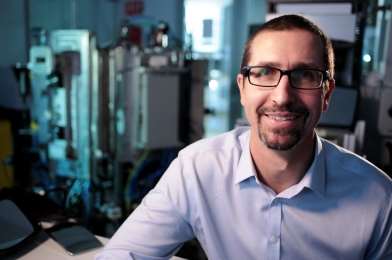Prime Minister Malcolm Turnbull has named coatings physicist Dr Colin Hall as the recipient of the inaugural Prime Minister’s Prize for New Innovators.
Dr Hall, who is a senior research fellow at the Future Industries Institute at the University of South Australia, was “creating jobs and exports through new car part technologies”, Turnbull said.
He was a “critical team member in the SMR Automotive and UniSA research partnership to develop a fully plastic wing mirror that can take all the road can offer,” the university said.
The plastic mirror replaces traditional heavier glass versions, lowering cost and vehicle weight and improving safety since it is less inclined to shatter.
So far, 1.6 million of the mirrors have been produced in Adelaide to date, creating sales in excess of $162 million globally.
Dr Hall received his $50,000 prize in Canberra and gave credit to colleagues at UniSA’s Future Industries Institute and at local manufacturers SMR.
“This has been a really rewarding partnership and one where we have worked hand-in-glove with our industry partners to deliver the technology to support the development of a product that answers all [its] challenges,” Dr Hall said.
“I am very proud to receive the award but also pleased to have earned it working with a dedicated ‘can do’ team around me.”
The Prime Minister’s innovation awards recognise outstanding researchers who have turned scientific research into a direct benefit to Australia’s economy.
Dr Hall’s team created the first version of the plastic mirror in 2009 and successfully commercialised the research in 2012.
He is now looking at other car parts that might also be conducive to remake using the materials technology.
“In the past four years we have developed illuminated badge concepts and have even made a satin-effect coating which have both been shown to European car makers,” Dr Hall said.
“We have improved the performance so that the plastic mirror technology can be used wherever plastic parts need to be made to look metallic.
“However, it must also be made at a commercial scale and acceptable price. If we can achieve this then, we may see the plastic mirror technology not just on many mirrors, but also throughout the cars.”
UniSA deputy vice chancellor of research, Professor Tanya Monro, praised Dr Hall for his focus on “translational research” – an area the current Government is seeking to build through the National Innovation and Science Agenda (NISA).
The Government has made no secret that it wants more university research to be commercialised and for universities to build closer ties with industry.
“Working at the interface of science and engineering, Dr Hall’s results have driven important innovation for the automotive industry,” Monro said.
“I know that his approach and that of the Thin Film Coatings Research Group at the Future Industries Institute will continue to be inspired by the needs of our industry partners and the creativity of our highly innovative researchers.”









